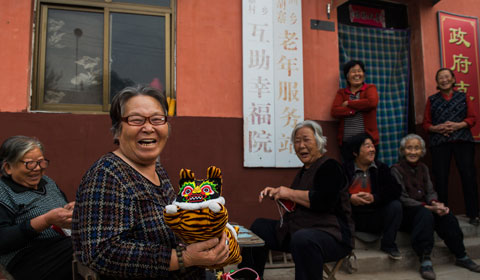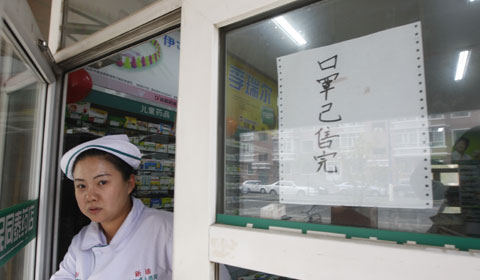Tidings from Roof of the World
Updated: 2013-10-19 08:25
By Hua Zi (China Daily USA)
|
||||||||
Human rights are well protected in Tibet and Tibetans enjoy the benefits of social and economic programs
The Universal Periodic Review of the United Nations Human Rights Council will issue the second review of China's human rights record on Oct 22. After the first review, China's Ministry of Foreign Affairs took the lead in organizing working groups to give effect to the suggestions of the UN's top human rights body.
About 20 non-governmental organizations and academic institutions were consulted and asked to contribute to the draft of China's human rights report, which was posted on the Ministry of Foreign Affairs' official website to solicit public opinions.
As an expert in Tibetology and human rights development in the Tibet autonomous region, I was among those asked to contribute to the draft report on China's human rights.
According to my observation, the term "human rights" was not part of the Tibetan language before 1959 when the democratic reform in Tibet began. Before 1959, Tibet was a society of feudalism and serfdom under theocratic rule. Under such a social system, more than 90 percent of the population was poor, oppressed, exploited and denied even the basic right to subsistence. Human rights, needless to say, was non-existent in such a society. For the serfs and slaves prior to the democratic reform, to live as a normal human being was only an unattainable dream.
It was only in the 1980s and early 1990s that the term "human rights" came to be used in the context of Tibet because that was when the West launched its so-called human rights diplomacy.
But some Westerners have been ignoring the violation of the rights of most Tibetans under feudalism and serfdom, which prevailed in the region before 1959, because their only aim is to accuse the central government of "harming" the culture, religion and freedom of expression of Tibetans. These Westerners have turned a blind eye to the well-being of Tibetans under the central government.
In fact, the central government and local authorities have gone to great lengths to develop agriculture and animal husbandry in Tibet, keeping in mind the tangible interests of Tibetans.
The Information Office of the State Council has published nine white papers on Tibet, which give a comprehensive account of the region in terms of its history, politics, economy, culture and religion. The per capita disposable income of urban dwellers in Tibet in 2012 was 18,056 yuan ($2,962), an increase of 11.5 percent year-on-year, and that of Tibetan peasants and herdsmen was 5,645 yuan, up 15.1 percent year-on-year. This shows the rapid development of Tibet.
Our research on the social and economic development in Tibet shows the region has made great progress in strengthening social security, with an increasing number of Tibetans covered by social insurance. The improvement in people's livelihood is the direct manifestation of the protection of human rights.
The 18th National Congress of the Communist Party of China, held in November last year, proposed creation of equal opportunities in rural and urban areas, because China is still a developing country where a large number of people depend on agriculture. Tibet is part of this plan, because peasants and herdsmen account for 80 percent of its total population.
Tibet is home to more than 1,780 Buddhist temples and monasteries and nearly 50,000 monks and nuns, mostly coming from peasants' and herdsmen's families. As a result, some elderly people are left with no family members to look after them and are forced to live in monasteries for the rest of their lives. In the past, the monasteries had to bear the cost of eldercare, but a new policy implemented by the Tibet autonomous region in November 2011 offers pension and medical insurance to monks and nuns in all monasteries and nunneries. This has not only eased the financial burden of the monasteries, but also hugely benefited the elderly people.
Last year, 21 monks above the age of 60 received their basic pension at the inauguration ceremony for pension distribution at Ganden Monastery in Lhasa, capital of the autonomous region. On the occasion, a 65-year-old monk said his dream had finally come true and thanked the government for making the rest of his life stress-free.
Most of the nunneries in Tibet are in remote places and thus receive little donation and financial subscription. But the central and local governments are now taking care of most of the medical needs of the people there. A deputy director of Canggu Nunnery's management committee says that after hearing about the preferential policies, an increasing number of nuns are buying pension and medical insurance.
Last year, I visited a nunnery in a high-altitude valley near Lhasa and was impressed by the solar water heaters installed by the government's working group in the solemn and picturesque cloister. Government projects have helped improve hygiene in nunneries and villages and, as a result, women today are less susceptible to contracting gynopathy.
Besides, the government has launched a free health check-up program to the benefit of urban and rural residents, as well as monks and nuns in Tibet, which the locals have welcomed wholeheartedly.
The human rights cause is progressing well in Tibet. My observation is only on part of the progress that China has made in improving the lives of theTibetan people.
The author is editor-in-chief of China Tibetology Publishing House, affiliated with the China Tibetology Research Center.
(China Daily USA10/23/2013 page11)
 Pumpkin fun ahead of Halloween
Pumpkin fun ahead of Halloween
 Weakening Raymond soaks Mexico, no serious damage
Weakening Raymond soaks Mexico, no serious damage Apple unveils new Macs, iPad ahead of holidays
Apple unveils new Macs, iPad ahead of holidays
 Smart cities to aid urbanization
Smart cities to aid urbanization
 In control & breaking the mold
In control & breaking the mold
 Higher retirement age may help solve pension problem
Higher retirement age may help solve pension problem
 Northeast remains shrouded in smog for third straight day
Northeast remains shrouded in smog for third straight day
 Beijing Opera troupe perform in Brazil
Beijing Opera troupe perform in Brazil
Most Viewed
Editor's Picks

|

|

|

|

|

|
Today's Top News
Top officials promote new power relations
Iowa, Hebei 'sister' visit wraps up
Yingli uses US sports stars in campaign
NASA: Chinese scientists not banned
China's US Treasury holdings hit six-month low
Graduate looks at kung fu-hip hop connection
Apple unveils new Macs, iPad
San Francisco train service restarts after strike
US Weekly

|

|







